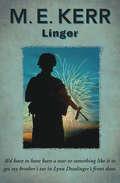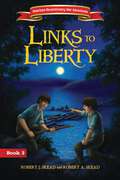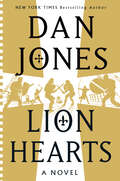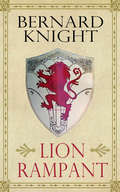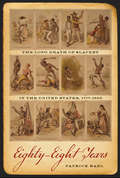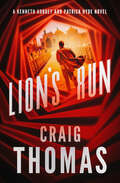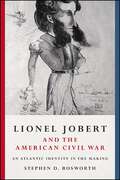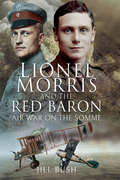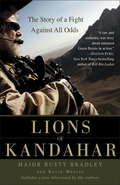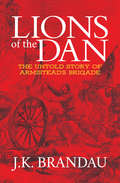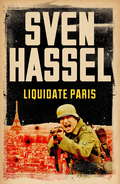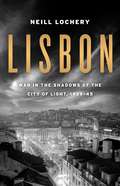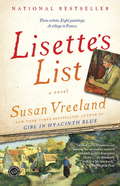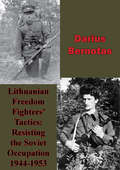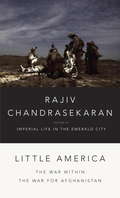- Table View
- List View
Linger
by M. E. KerrIn this novel by the award-winning author of Gentlehands and Slap Your Sides, a teenager starts to look at life differently when his older brother is sent to the Persian GulfTo sixteen-year-old Gary Peel, Linger is home. His father is manager of the Pennsylvania restaurant; his mom takes care of the books; and Gary's older brother, Bobby, works there as a waiter. That is, until he decides to join the army.The only one from their hometown to enlist, Bobby becomes an instant hero. At Linger, Gary takes Bobby's place waiting tables--and finds himself drawn into the correspondence between his brother and Lynn Dunlinger, the beautiful, preppy daughter of the restaurant's owner. The tone of Bobby's letters starts to change when he's suddenly shipped overseas. Gary--the brother left behind--tries to adjust to his new life and prepares for the first Christmas without Bobby.Set during the Gulf War crisis and featuring a diverse cast of characters, Linger interweaves Gary's first-person narrative with Bobby's letters and journal entries from Saudi Arabia in a multifaceted look at bigotry, power, and the valor under fire that can drive ordinary people to commit extraordinary acts. This ebook features an illustrated personal history of M. E. Kerr including rare images from the author's collection.
Lingua Franca and Français Tirailleur: From Sea Jargon to Military Order?
by Joanna NolanThis book explores how the eponymous and original Lingua Franca was recognized as a potential linguistic template for future military and colonial pidgins. The author traces the career trajectory of General Louis Faidherbe, a member of the French colonizing force in Algiers in the early 1830s and a recognized linguist, who rose up through the ranks in various African colonies and was the founder of regiments in West Africa, including the Senegal-based tirailleurs. Their artificially constructed military pidgin, Français Tirailleur, was a language modelled on the reduced grammar and lexicon of Lingua Franca. This book demonstrates the direct link between the two languages, as well as connections with other colonial pidgins in Asia that also derived to some extent from Lingua Franca. It will be of interest to students and scholars of language contact and language history, pidgins and creoles, and military and colonial history.
Links to Liberty (American Revolutionary War Adventures)
by Robert J. SkeadIn book three of the American Revolutionary War Adventures historical fiction series, readers ages 8-12 can experience the Revolutionary War firsthand in this novel based on actual events. Sixteen-year-old twins Ambrose and John Clark, who have helped the fight for freedom by assisting their father and even accomplishing a mission for George Washington himself are faced with more dangerous challenges. Now the boys must work together with bravery and courage to help the cause of independence.In addition to bringing alive America&’s war for independence, Links to Liberty:Teaches kids about the Revolutionary War from a kid&’s perspectiveIs packed with historical information that is entertaining and educationalContains discussion questions, backgrounds on the real-life historical persons featured in the book, and historical lettersCan be used alongside school curriculum and as a homeschool resource In this third adventure, the brothers search to find the traitor who has put their father and brother as well as the cause of independence in jeopardy. As they bravely, and sometimes impetuously search for the culprit, hoping to make him pay, they must also make a life-changing decision—to follow Major Tallmadge&’s lead and train as Dragoon&’s in the Continental Army or accept scholarships to Yale, leaving behind the danger of war and spy intrigue.
Lion Hearts: A Novel (Essex Dogs Trilogy)
by Dan JonesThe thrilling, unmissable conclusion to the Essex Dogs trilogy by the New York Times bestselling historian Dan Jones1350. The Essex Dogs have scattered. In Winchelsea, Loveday struggles to keep his tavern afloat in the aftermath of the Black Death. Nowadays, the only battles he fights are the ones within his own mind.In Windsor, Romford thrives as a squire at King Edward III's court, his days as an archer fading into memory. But when an unpaid debt threatens everything he's built, Romford must call upon the lessons he learned all those years ago: be cunning. Be ruthless. Be quick.With England still reeling from the Death and a new threat from Spain on the rise, the kingdom's future has never been more uncertain.Each man had reasons for leaving the Essex Dogs behind. But a life like that isn't so easily forgotten.And for these men the fighting isn't over yet.
Lion In The Bay: The British Invasion Of The Chesapeake, 1813-14
by Chipp Reid Stanley L. QuickThis is the story of the War of 1812 like no other, brought to life in narrative form with pinpoint historical details. As the War of 1812 raged on the high seas and along the Canadian border, the British decided to strike at the heart of the United States, the relatively undefended area of the Chesapeake Bay. The Chesapeake was a fertile farm region, a renowned place of shipbuilding and an area divided along political lines over the war. Admiral George Cockburn led the British into the bay in March 1813. After a failed attempt to take Norfolk, Cockburn led the British up and down the Chesapeake. Originally a campaign to relieve pressure from other fronts, the Chesapeake theater soon became a campaign of retribution for the British, turning what had been an economic engine for America into a region of terrorized citizens, destroyed farms and fears of slave insurrection. The blockade choked American commerce and prevented privateers from taking the war to the English. Cockburn returned in 1814 and once more terrorized the residents on both shores of the Chesapeake while stoking the political divisions that also rent the country. In August, 1814, the British capitalized on the refusal of President James Madison to bolster the defenses of the waterway that led to the nation’s capital. Cockburn again led a naval force into the bay, but this time he ran into opposition from Commodore Joshua Barney and his polyglot flotilla of warships. Barney put up an heroic though doomed fight before the British landed at Benedict, Md. , in August, 1814 and marched on Washington, D. C. After defeating the Americans at Bladensburg, the British burned Washington before returning to their boats and setting out for Baltimore. There, the British armada ran into Fort McHenry and a stalwart group of defenders. Despite a massive bombardment, the British could not silence the fort or the city’s other defenses, forcing them to retreat and give up their campaign to completely shut the Chesapeake. The victory at Baltimore, coupled with victories on the Great Lakes, helped turn the war in America’s favor.
Lion Rampant
by Bernard KnightA historical epic by Bernard Knight, Lion Rampant is set in medieval Wales and features the tale of Nest, a princess known as 'the Welsh Helen of Troy'. Nest was a lover of King Henry I of England, married the steward of a Pembrokeshire castle (giving rise to the FitzStephen and FitzGerald families, including Gerald of Wales), and was later abducted by a marauding Welsh noble. This is the story of the adventure, intrigue, and warfare in the various kingdoms of Wales during the twelfth century.
Lion Rampant
by Bernard KnightA historical epic by Bernard Knight, Lion Rampant is set in medieval Wales and features the tale of Nest, a princess known as 'the Welsh Helen of Troy'. Nest was a lover of King Henry I of England, married the steward of a Pembrokeshire castle (giving rise to the FitzStephen and FitzGerald families, including Gerald of Wales), and was later abducted by a marauding Welsh noble. This is the story of the adventure, intrigue, and warfare in the various kingdoms of Wales during the twelfth century.
Lion Rampant - Medieval Wargaming Rules
by Mark Stacey Daniel MerseyLion Rampant is a set of rules designed for fighting historical or Hollywood battles in the medieval period from the Norman Conquest to the Hundred Years' War. This period is well suited to large skirmish gaming as played with Lion Rampant as it was a time of anarchy, feuds, robbery, and raiding. Become Robin Hood, Richard the Lionheart, Gamelyn, William Wallace, Llewellyn the Last, or other legends and leaders from the colorful, dangerous medieval period. Lion Rampant is ideal for players who wish to collect medieval miniatures without wanting to muster huge forces or spend time learning complex rules.Gameplay is very simple, and requires the player to use units in the correct tactical way: knights are great at charging down enemies but less useful for guarding convoys, while spearmen are jacks of all trades and masters of none, and bowmen are to be feared at distance but easily cut down if you can get close enough. An army usually consists of 6-8 units comprised of 6-12 individually based figures (making it ideal for 15mm or 28mm games), and is led by a Leader, who may have some unique character traits that affect game play and provide some opportunity for role playing. The action, however, focuses very much on the small units involved in the battle rather than individual characters: each unit moves and fights independently, assuming that they follow your orders rather than just doing their own thing. Command and control is just as important on the battlefield as the power of a mounted knight.Some army lists are provided, and guidance given for players seeking to create their own forces, but this game is not army list-heavy. The rules include a good number of scenarios, which are important to this style of gaming.
Lion's Run (The Kenneth Aubrey & Patrick Hyde Series)
by Craig ThomasNew York Times–Bestselling Author: A British spy goes into action when his boss is framed for treason in this &“bracing thriller . . . the suspense is galvanizing&” (The Wall Street Journal). After baiting Kenneth Aubrey with a potential defector, the KGB gets their hooks in by framing Aubrey himself as a traitor—and a killer. Now the head of British intelligence is enduring house arrest and interrogation, and things look bleak. His field agent, Patrick Hyde, is convinced someone within their own ranks must have conspired with the KGB to destroy the long-serving spymaster—and his quest to uncover the double agent will take him from Afghanistan to Czechoslovakia and into a top-secret computer system . . . &“A cloak-and-dagger grand tour . . . When it comes to keeping the story moving and stoking up the excitement, Mr. Thomas knows his business.&” —The New York Times
Lionel Jobert and the American Civil War: An Atlantic Identity in the Making
by Stephen D. BosworthMillions of soldiers and civilians passionately supported one side or the other in the American Civil War. For Colonel Lionel Jobert d'Epineuil of the Fifty-Third New York Volunteer Regiment, however, his own advancement mattered more than the outcome of the conflict. This biography analyzes the remarkable exploits of a man driven by ambition—and unhindered by scruples—to attain position and prestige in the Atlantic region during the second half of the nineteenth century.Lionel Jobert (1829–1881) was born in France, but is described as having an Atlantic identity. A ship captain by trade, Jobert exploited unstable governmental conditions in Haiti and the United States to pursue his private interests. Drawing on previously unused sources, Stephen D. Bosworth allows us to view the Civil War from the perspective of a foreign participant whose life constitutes one colorful tile in the vast mosaic that makes up the history of the nineteenth-century Atlantic.
Lionel Morris and the Red Baron: Air War on the Somme
by Jill BushA biography of the young, London-born, World War I pilot who was the first to be shot down by the legendary Red Baron. Nineteen-year-old Lionel Morris left the infantry for the wood and wires of the Royal Flying Corps on the Western Front in 1916, joining one of the world&’s first fighter units alongside the great ace Albert Ball. Learning on the job, in dangerously unpredictable machines, Morris came of age as a combat pilot on the first day of the Battle of the Somme, as the R.F.C. was winning a bloody struggle for admiralty of the air. As summer faded to autumn and the skies over Bapaume filled with increasing numbers of enemy aircraft, the tide turned. On 17 September 1916, Morris&’s squadron was attacked by a lethally efficient German unit, including an unknown pilot called Manfred von Richthofen. As the shock waves spread from the empty hangars of No.11 Squadron all the way to the very top of the British Army, the circumstances surrounding Morris&’s death marked a pivotal shift in the aerial war, and the birth of its greatest legend. Told through previously unpublished archive material, the words of contemporaries, and official records, Lionel Morris and the Red Baron traces a short but extraordinary life and reveals how Morris&’s role in history was rediscovered one hundred years after his death. Praise for Lionel Morris and the Red Baron &“The best written World War I aviation history account this reviewer has read in some time . . . has earned the highest recommendation.&” —Over the Front &“This is a book that deserves to be read.&” —The Aviation Historian
Lionel Robbins
by Susan HowsonBy the time of his death the English economist Lionel Robbins (1898-1984) was celebrated as a 'renaissance man'. He made major contributions to his own academic discipline and applied his skills as an economist not only to practical problems of economic policy - with conspicuous success when he served as head of the economists advising the wartime coalition government of Winston Churchill in 1940-45 - and of higher education - the 'Robbins Report' of 1963 - but also to the administration of the visual and performing arts that he loved deeply. He was devoted to the London School of Economics, from his time as an undergraduate following active service as an artillery officer on the Western Front in 1917-18, through his years as Professor of Economics (1929-62), and his stint as chairman of the governors during the 'troubles' of the late 1960s. This comprehensive biography, based on his personal and professional correspondence and other papers, covers all these many and varied activities.
Lionheart: A rip-roaring epic novel of one of history’s greatest warriors by the Sunday Times bestselling author
by Ben KaneREBEL. LEADER. BROTHER. KING.1179. Henry II is King of England, Wales, Ireland, Normandy, Brittany and Aquitaine. The House of Plantagenet reigns supreme.But there is unrest in Henry's house. Not for the first time, his family talks of rebellion.Ferdia - an Irish nobleman taken captive during the conquest of his homeland - saves the life of Richard, the king's son. In reward for his bravery, he is made squire to Richard, who is already a renowned warrior.Crossing the English Channel, the two are plunged into a campaign to crush rebels in Aquitaine. The bloody battles and gruelling sieges which followed would earn Richard the legendary name of Lionheart.But Richard's older brother, Henry, is infuriated by his sibling's newfound fame. Soon it becomes clear that the biggest threat to Richard's life may not be rebel or French armies, but his own family...'A rip-roaring epic, filled with arrows and spattered with blood. Gird yourself with mail when you start.' Paul Finch'Ben's deeply authoritative depiction of the time is delivered in a deft manner.' Simon Scarrow
Lionheart: The perfect gift for Father’s Day
by Ben KaneREBEL. LEADER. BROTHER. KING.1179. Henry II is King of England, Wales, Ireland, Normandy, Brittany and Aquitaine. The House of Plantagenet reigns supreme.But there is unrest in Henry's house. Not for the first time, his family talks of rebellion.Ferdia - an Irish nobleman taken captive during the conquest of his homeland - saves the life of Richard, the king's son. In reward for his bravery, he is made squire to Richard, who is already a renowned warrior.Crossing the English Channel, the two are plunged into a campaign to crush rebels in Aquitaine. The bloody battles and gruelling sieges which followed would earn Richard the legendary name of Lionheart.But Richard's older brother, Henry, is infuriated by his sibling's newfound fame. Soon it becomes clear that the biggest threat to Richard's life may not be rebel or French armies, but his own family...'A rip-roaring epic, filled with arrows and spattered with blood. Gird yourself with mail when you start.' Paul Finch'Ben's deeply authoritative depiction of the time is delivered in a deft manner.' Simon Scarrow
Lions of Kandahar: The Story of a Fight Against All Odds
by Rusty Bradley Kevin MaurerOne of the most critical battles of the Afghan War is now revealed as never before. Lions of Kandahar is an inside account from the unique perspective of an active-duty U.S. Army Special Forces commander, an unparalled warrior with multiple deployments to the theater who has only recently returned from combat there.Southern Afghanistan was slipping away. That was clear to then-Captain Rusty Bradley as he began his third tour of duty there in 2006. The Taliban and their allies were infiltrating everywhere, poised to reclaim Kandahar Province, their strategically vital onetime capital. To stop them, the NATO coalition launched Operation Medusa, the largest offensive in its history. The battlefield was the Panjwayi Valley, a densely packed warren of walled compounds that doubled neatly as enemy bunkers, lush orchards, and towering marijuana stands, all laced with treacherous irrigation ditches. A mass exodus of civilians heralded the carnage to come.Dispatched as a diversionary force in support of the main coalition attack, Bradley's Special Forces A-team and two others, along with their longtime Afghan Army allies, watched from across the valley as the NATO force was quickly engulfed in a vicious counterattack. Key to relieving it and calling in effective air strikes was possession of a modest patch of high ground called Sperwan Ghar. Bradley's small detachment assaulted the hill and, in the midst of a savage and unforgettable firefight, soon learned they were facing nearly a thousand seasoned fighters--from whom they seized an impossible victory.Now Bradley recounts the whole remarkable story as it actually happened. The blistering trek across Afghanistan's infamous Red Desert. The eerie traces of the elusive Taliban. The close relations with the Afghan people and army, a primary mission focus. Sperwan Ghar itself: unremitting waves of fire from machine guns and rocket-propelled grenades; a targeted truck turned into an inferno; the death trap of a cut-off compound. Most important: the men, Americans and Afghans alike--the "shaky" medic with nerves of steel and a surgeon's hands in battle; the tireless sergeant who seems to be everywhere at once; the soft-spoken intelligence officer with laser-sharp insight; the diminutive Afghan commander with a Goliath-sized heart; the cool maverick who risks all to rescue a grievously wounded comrade--each unique, all indelible in their everyday exercise of extraordinary heroism.From the Hardcover edition.
Lions of the Dan: The Untold Story of Armistead's Brigade
by J.K. Brandau&“Tells the brigade&’s long history for the first time . . . captures the daily grind of soldiers striving and struggling in the ranks . . . A triumph&” (Peter S. Carmichael, Robert C. Fluhrer Professor of Civil War Studies and Director of the Civil War Institute, Gettysburg College). This unique history chronicles those men of Pickett&’s Charge over the full course of the Civil War. While time-honored celebrations of Armistead and Pickett focus narrowly on moments at Gettysburg, primary sources declare the untold story of the best of men in the worst of times, and refutes Lost Cause myths surrounding Armistead and Pickett. For the first time, Lions of the Dan widens the aperture to introduce real heroes and amazing deeds that have been suppressed until now. The author presents the experiences of real soldiers in their own words and highlights the much-ignored history of Southside Virginia, presenting the Civil War start to finish from a unique regional perspective. Readers will find their pedestrian notions of the founding of the South&’s peculiar institution challenged as they read an objective account of Virginia&’s secession and celebrate the courage and devotion of soldiers on both sides.
Lipstick in Afghanistan
by Roberta GatelyRoberta Gately’s lyrical and authentic debut novel—inspired by her own experiences as a nurse in third world war zones—is one woman’s moving story of offering help and finding hope in the last place she expected. Gripped by haunting magazine images of starving refugees, Elsa has dreamed of becoming a nurse since she was a teenager. Of leaving her humble working-class Boston neighborhood to help people whose lives are far more difficult than her own. No one in her family has ever escaped poverty, but Elsa has a secret weapon: a tube of lipstick she found in her older sister’s bureau. Wearing it never fails to raise her spirits and cement her determination. With lipstick on, she can do anything—even travel alone to war-torn Afghanistan in the wake of 9/11. But violent nights as an ER nurse in South Boston could not prepare Elsa for the devastation she witnesses at the small medical clinic she runs in Bamiyan. As she struggles to prove herself to the Afghan doctors and local villagers, she begins a forbidden romance with her only confidant, a charming Special Forces soldier. Then, a tube of lipstick she finds in the aftermath of a tragic bus bombing leads her to another life-changing friendship. In her neighbor Parween, Elsa finds a kindred spirit, fiery and generous. Together, the two women risk their lives to save friends and family from the worst excesses of the Taliban. But when the war waging around them threatens their own survival, Elsa discovers her only hope is to unveil the warrior within. Roberta Gately’s raw, intimate novel is an unforgettable tribute to the power of friendship and a poignant reminder of the tragic cost of war.
Liquidate Paris (Cassell Military Paperbacks Ser.)
by Sven HasselLIQUIDATE PARIS shows the eruption of the Second World War in its most brutal and cruel phase, as allied troops advance upon Paris and the penal regiment retreat.I had a grenade in my hand. So, no doubt, did the English private. I tore out the pin with my teeth. Lay there and counted. Twenty-one, twenty-two, twenty-three, twenty-four...It is Hitler's last chance to save the Third Reich...Millions of Allied troops have landed in Normandy.The orders are clear: Sven and his comrades, hardened by a savage war that has led them from the bloody steppes of the Russian Front, to the slopes of Monte Cassino, are ordered to withdraw to Strasbourg and destroy Paris on the way...
Liquidate Paris (Sven Hassel War Classics)
by Sven HasselLIQUIDATE PARIS shows the eruption of the Second World War in its most brutal and cruel phase, as allied troops advance upon Paris and the penal regiment retreat.I had a grenade in my hand. So, no doubt, did the English private. I tore out the pin with my teeth. Lay there and counted. Twenty-one, twenty-two, twenty-three, twenty-four...It is Hitler's last chance to save the Third Reich...Millions of Allied troops have landed in Normandy.The orders are clear: Sven and his comrades, hardened by a savage war that has led them from the bloody steppes of the Russian Front, to the slopes of Monte Cassino, are ordered to withdraw to Strasbourg and destroy Paris on the way...
Lisbon: War in the Shadows of the City of Light, 1939-45
by Neill LocheryLisbon had a pivotal role in the history of World War II, though not a gun was fired there. The only European city in which both the Allies and the Axis power operated openly, it was temporary home to much of EuropeOCOs exiled royalty, over one million refugees seeking passage to the U. S. , and a host of spies, secret police, captains of industry, bankers, prominent Jews, writers and artists, escaped POWs, and black marketeers. An operations officer writing in 1944 described the daily scene at LisbonOCOs airport as being like the movie ?Casablanca, OCO times twenty. In this riveting narrative, renowned historian Neill Lochery draws on his relationships with high-level Portuguese contacts, access to records recently uncovered from Portuguese secret police and banking archives, and other unpublished documents to offer a revelatory portrait of the WarOCOs back stage. And he tells the story of how Portugal, a relatively poor European country trying frantically to remain neutral amidst extraordinary pressures, survived the war not only physically intact but significantly wealthier. The countryOCOs emergence as a prosperous European Union nation would be financed in part, it turns out, by a cache of Nazi gold.
Lisette's List: A Novel
by Susan VreelandFrom Susan Vreeland, bestselling author of such acclaimed novels as Girl in Hyacinth Blue, Luncheon of the Boating Party, and Clara and Mr. Tiffany, comes a richly imagined story of a woman's awakening in the south of Vichy France--to the power of art, to the beauty of provincial life, and to love in the midst of war. In 1937, young Lisette Roux and her husband, André, move from Paris to a village in Provence to care for André's grandfather Pascal. Lisette regrets having to give up her dream of becoming a gallery apprentice and longs for the comforts and sophistication of Paris. But as she soon discovers, the hilltop town is rich with unexpected pleasures. Pascal once worked in the nearby ochre mines and later became a pigment salesman and frame maker; while selling his pigments in Paris, he befriended Pissarro and Cézanne, some of whose paintings he received in trade for his frames. Pascal begins to tutor Lisette in both art and life, allowing her to see his small collection of paintings and the Provençal landscape itself in a new light. Inspired by Pascal's advice to "Do the important things first," Lisette begins a list of vows to herself (#4. Learn what makes a painting great). When war breaks out, André goes off to the front, but not before hiding Pascal's paintings to keep them from the Nazis' reach. With German forces spreading across Europe, the sudden fall of Paris, and the rise of Vichy France, Lisette sets out to locate the paintings (#11. Find the paintings in my lifetime). Her search takes her through the stunning French countryside, where she befriends Marc and Bella Chagall, who are in hiding before their flight to America, and acquaints her with the land, her neighbors, and even herself in ways she never dreamed possible. Through joy and tragedy, occupation and liberation, small acts of kindness and great acts of courage, Lisette learns to forgive the past, to live robustly, and to love again.
Listen to the Moon
by Michael MorpurgoAlfie and his father find a lost girl in an abandoned house on a small island. The girl doesn't speak, except to say what sounds like "Lucy." Alfie's mother nurses her back to health. <P><P>The others in the village suspect the unthinkable: Lucy is actually German--an enemy--because she's found with a blanket with a German tag. <P><P>Told from Alfie and Merry's points of view, this exquisite novel tells of friends, enemies, and unexpected kindnesses.
Listening to Britain: Home Intelligence Reports on Britain's Finest Hour, May-September 1940
by Paul Addison Jeremy A CrangFrom May to September 1940, a period that saw some of the most dramatic events in British history - including the evacuation of Dunkirk, the Battle of Britain and the opening stages of the Blitz - the Ministry of Information eavesdropped on the conversations of ordinary people in all parts of the United Kingdom and compiled secret daily reports on the state of popular morale.
Lithuanian Freedom Fighters' Tactics: Resisting The Soviet Occupation 1944-1953
by Darius BernotasAlthough the end of World War II enabled devastated countries to rebuild and enjoy a time of peace, another bloody war had just started in Lithuania. Lithuanian Freedom Fighters (LFF) fought for almost a decade (1944-1953) against the Soviets who occupied their country after World War II. This research focuses on LFF tactics that enabled them to oppose greatly superior Soviet forces for an extended period of time and on the factors that resulted in eventual defeat of LFF armed resistance. The research utilized the elements of combat power as the measurement criteria to describe the LFF tactics.The author concludes that the LFF tactics were to some extent effective. LFF managed to adapt tactics in accordance with a changing situation in terms of shifting Soviet tactics and wrong initial assumptions regarding international support. The other factor that contributed to the LFF success fighting the superior enemy for almost a decade was related to LFF ability to mitigate LFF combat power elements' weaknesses while exploiting their strengths.Nevertheless, the absence of both political and material international support along with Soviet success in cutting off population support to the LFF were two main reasons that resulted in the gradual defeat of the armed resistance.As asymmetric warfare is likely to continue playing an important role in future conflicts, members of the military profession should find it useful to familiarize themselves with this research. A thorough analysis of LFF tactics employing a combination of regular and irregular warfare to counter superior forces should assist military professionals in further deepening their understanding of asymmetric warfare phenomena thus contributing to their awareness of contemporary operational environment.
Little America: The War Within the War for Afghanistan
by Rajiv ChandrasekaranFrom the award-winning author of Imperial Life in the Emerald City, a riveting, intimate account of America's troubled war in Afghanistan. When President Barack Obama ordered the surge of troops and aid to Afghanistan, Washington Post correspondent Rajiv Chandrasekaran followed. He found the effort sabotaged not only by Afghan and Pakistani malfeasance but by infighting and incompetence within the American government: a war cabinet arrested by vicious bickering among top national security aides; diplomats and aid workers who failed to deliver on their grand promises; generals who dispatched troops to the wrong places; and headstrong military leaders who sought a far more expansive campaign than the White House wanted. Through their bungling and quarreling, they wound up squandering the first year of the surge. Chandrasekaran explains how the United States has never understood Afghanistan--and probably never will. During the Cold War, American engineers undertook a massive development project across southern Afghanistan in an attempt to woo the country from Soviet influence. They built dams and irrigation canals, and they established a comfortable residential community known as Little America, with a Western-style school, a coed community pool, and a plush clubhouse--all of which embodied American and Afghan hopes for a bright future and a close relationship. But in the late 1970s--after growing Afghan resistance and a Communist coup--the Americans abandoned the region to warlords and poppy farmers. In one revelatory scene after another, Chandrasekaran follows American efforts to reclaim the very same territory from the Taliban. Along the way, we meet an Army general whose experience as the top military officer in charge of Iraq's Green Zone couldn't prepare him for the bureaucratic knots of Afghanistan, a Marine commander whose desire to charge into remote hamlets conflicted with civilian priorities, and a war-seasoned diplomat frustrated in his push for a scaled-down but long-term American commitment. Their struggles show how Obama's hope of a good war, and the Pentagon's desire for a resounding victory, shriveled on the arid plains of southern Afghanistan. Meticulously reported, hugely revealing, Little America is an unprecedented examination of a failing war--and an eye-opening look at the complex relationship between America and Afghanistan.From the Hardcover edition.
